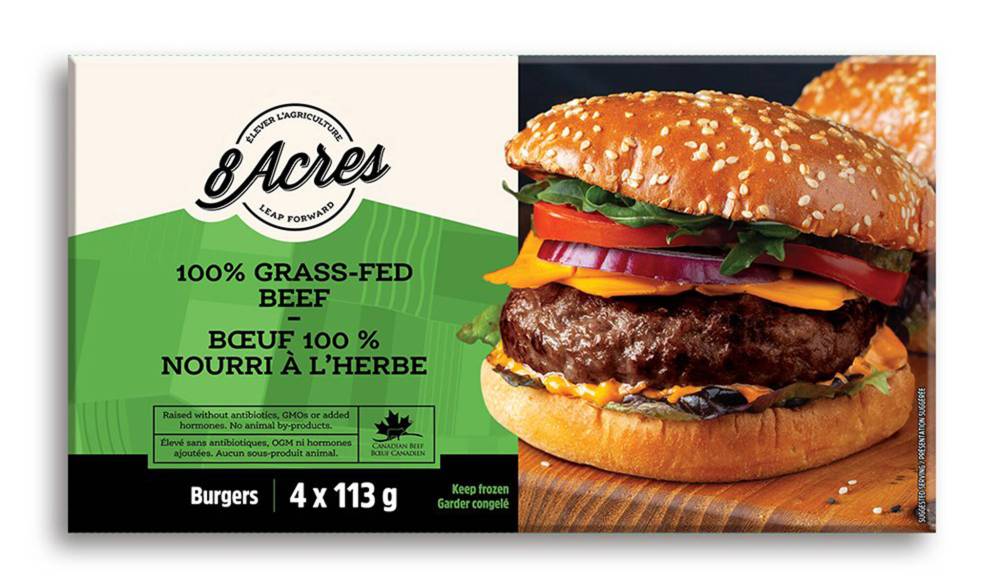Prairie grass-fed beef producer enters Manitoba market
8 Acres Farms ‘very happy’ with space on Red River Co-op shelves
Advertisement
Read this article for free:
or
Already have an account? Log in here »
To continue reading, please subscribe:
Monthly Digital Subscription
$19 $0 for the first 4 weeks*
- Enjoy unlimited reading on winnipegfreepress.com
- Read the E-Edition, our digital replica newspaper
- Access News Break, our award-winning app
- Play interactive puzzles
*No charge for 4 weeks then billed as $19 every four weeks (new subscribers and qualified returning subscribers only). Cancel anytime.
Read unlimited articles for free today:
or
Already have an account? Log in here »
Bryce Lobreau of Pipestone started raising organic beef years ago. Now, he is finally going to be able to sell his comapny’s product in Manitoba.
This week, the nine Red River Co-op grocery stores in the province will start carrying the 8 Acres Farms brand — the first fresh grass-fed beef they have stocked.
It also marks the first time Manitobans will have access to the four-year-old company that, to date, had only been able to find space in upscale retailers in Ontario and Quebec.

Company co-founders Lobreau and Ben Stuart (whose ranch is located at Canora, Sask.) are excited to finally get into local stores.
“We’re very happy that Manitobans will be able to buy our 8 Acres product,” said Lobreau. “Red River Co-op will be a good partner for us. They support Prairie business and we want to support them.”
Lobreau and Stuart, a transplanted New Zealander, teamed up after they were both supplying to a processor who couldn’t continue its organic and grass-fed program.
The pair were dedicated to the system — it’s more time-consuming and costly, but better for the environment and consumers, they say — and wanted to see if they could build a market in Canada.
Lobreau raises organic beef in Manitoba and Stuart raises a grass-fed herd in Saskatchewan, although they are in the process of reorganizing their farms so they can move animals back and forth if they need to.
Before this week, they were only selling both grass-fed and organic product via Sobeys, Farm Boy, Longo’s and Whole Foods locations in Ontario and Quebec.
That kind of beef is premium-priced, but 8 Acres doesn’t change its pricing each week based on the current commodity market. (Lobreau figures 8 Acres’ retail pricing is anywhere from 20 to 100 per cent more expensive than conventionally sourced beef.)
Sean Burbank, an operations adviser for Federated Co-op, said 8 Acres beef will be priced competitively versus conventional beef. “We think it will probably be good for the stores, but it will definitely be good for the consumer.”
Lobreau said 8 Acres has been diligent about servicing its retail partners, with a solid track record of filling all its orders. He realizes it has not been around for too long and wants to establish the kind of reputation that might lead to more retailers coming on board.
The company’s hope with the Red River Co-op deal is, if the product works, it might be expanded both to include organic beef and also potentially distributed throughout the Federated Co-op network across Western Canada.
(A result, Burbank acknowledged, could happen.)
Both the Manitoba and Saskatchewan ranches keep their animals on site from the time they are born until they are sent to the slaughter house — something rare, if not completely unheard of, in the more traditional beef industry.
Sales have been steadily increasing over the four years, Lobreau said, “but not gangbusters.”

Lobreau has about 600 dams and Stuart has about 800. They both sub-contract a small amount to third-party producers — something they want to do more of as other producers get into the organic and grass-fed/grass-finished market.
Processing is done at True North Foods in Carman. Final retail packaging is done at a Sysco plant in Vaughan, Ont.
Calvin Vaags, president and co-owner of True North Foods, called 8 Acres “a good and important” client.
While Lobreau and Stuart came together because they could no longer work with their previous processor, Vaags ended up owning True North (which was formerly called Plains Processors) when the previous owners convinced him to take it over.
“I had no intention of owning a beef-processing plant,” said Vaags, who farms 3,000 acres near Carman and operates a cattle feed lot.
Vaags secured federal certification in 2015 (it is the only federally certified beef processor between Brooks, Alta., and Guelph, Ont.) and is just finishing up a second expansion on what will be a 60,000-square-foot facility.
Meanwhile, Lobreau and Stuart are keen to keep things rolling.
In addition to getting certified organic certification at their Saskatchewan ranch, they are keen to attract more third-party producers.
“It’s good for the land. It’s a good way to farm,” said Stuart.
martin.cash@freepress.mb.ca

Martin Cash
Reporter
Martin Cash has been writing a column and business news at the Free Press since 1989. Over those years he’s written through a number of business cycles and the rise and fall (and rise) in fortunes of many local businesses.


